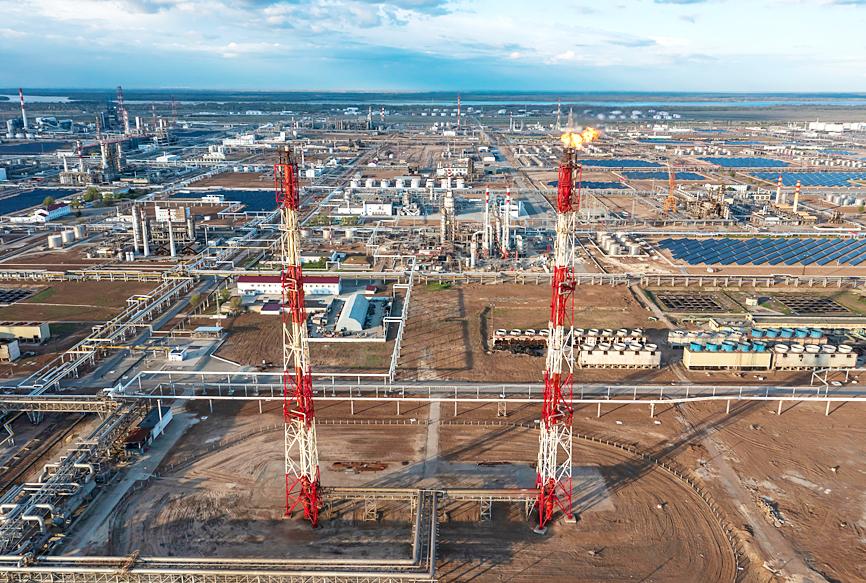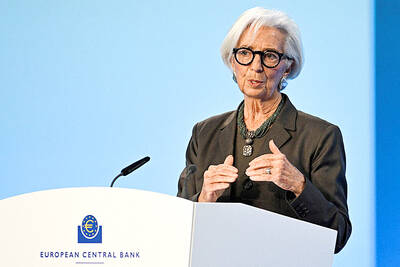Oil dropped for the third week out of the last four with China facing a large consumption hit and the US Federal Reserve signaling that it plans to aggressively tighten monetary policy to curb inflation.
West Texas Intermediate for May delivery fell 1.66 percent to US$102.07 a barrel, declining 4.56 percent during a volatile trading week.
Brent crude for June delivery dropped 1.55 percent to US$106.65, falling 4.52 percent from a week earlier.

Photo: Reuters
Fuel consumption in China, the world’s biggest crude importer, is expected to drop 20 percent year-on-year in April, people with inside knowledge of the country’s energy industry said.
The country has imposed a series of lockdowns, including in Shanghai to stamp out a COVID-19 wave.
The drop in fuel demand is the equivalent to a decline of 1.2 million barrels a day, the people said.
“Shrinking demand is a direct result of the impact of lower economic activity globally,” Rystad Energy senior vice president of analysis Claudio Galimberti said.
This year, “oil demand is set to shed 1.4 million barrels per day, dropping below the highs set in 2019,” Galimberti said.
The macroeconomic picture is also creating headwinds for crude. Investors are bracing for the US central bank to hike interest rates at a rapid clip, with US Federal reserve Chairman Jerome Powell signaling two or more half percentage-point increases in comments on Thursday.
The pivot has boosted the US dollar, making commodities more expensive for holders of other currencies.
Oil remains about 35 percent higher this year, despite its recent weakness, as the fallout from Moscow’s invasion of Ukraine continues to rattle markets and roil crude flows.
There are calls for the EU to ban Russian oil, matching steps taken by the US and UK. Support for prices has also come from interruptions to supplies from Libya amid a wave of protests.
“We’re in this middle ground area where we are waiting to see whether [the] EU will ban Russian oil,” City Index senior financial markets analyst Fiona Cincotta said. “That’s the one event that will change the course of oil prices considerably.”
Shanghai, China’s main commercial hub, vowed to step up the enforcement of lockdown measures, disappointing expectations that its outbreak had peaked.
Reflecting the drag caused by the disruption, economists polled by Bloomberg once again lowered their growth forecasts for China.
Still, Morgan Stanley raised its forecasts for Brent crude by US410 for the third and fourth quarters.
The bank said it sees tighter market balances, with a deficit of about 1 million barrels a day persisting throughout the year, it said in a note on Thursday.
“Risks to prices are skewed to the upside,” the bank said. “We see a high risk that the EU will enact an import embargo for Russian crude, although it would probably be implemented with a lengthy grace period of four-to-five months.”
Additional reporting by staff writer

European Central Bank (ECB) President Christine Lagarde is expected to step down from her role before her eight-year term ends in October next year, the Financial Times reported. Lagarde wants to leave before the French presidential election in April next year, which would allow French President Emmanuel Macron and German Chancellor Friedrich Merz to find her replacement together, the report said, citing an unidentified person familiar with her thoughts on the matter. It is not clear yet when she might exit, the report said. “President Lagarde is totally focused on her mission and has not taken any decision regarding the end of

French President Emmanuel Macron told a global artificial intelligence (AI) summit in India yesterday he was determined to ensure safe oversight of the fast-evolving technology. The EU has led the way for global regulation with its Artificial Intelligence Act, which was adopted in 2024 and is coming into force in phases. “We are determined to continue to shape the rules of the game... with our allies such as India,” Macron said in New Delhi. “Europe is not blindly focused on regulation — Europe is a space for innovation and investment, but it is a safe space.” The AI Impact Summit is the fourth

CONFUSION: Taiwan, Japan and other big exporters are cautiously monitoring the situation, while analysts said more Trump responses ate likely after his loss in court US trading partners in Asia started weighing fresh uncertainties yesterday after President Donald Trump vowed to impose a new tariff on imports, hours after the Supreme Court struck down many of the sweeping levies he used to launch a global trade war. The court’s ruling invalidated a number of tariffs that the Trump administration had imposed on Asian export powerhouses from China and South Korea to Japan and Taiwan, the world’s largest chip maker and a key player in tech supply chains. Within hours, Trump said he would impose a new 10 percent duty on US imports from all countries starting on

STRATEGIC ALLIANCE: The initiative is aimed at protecting semiconductor supply chain resilience to reduce dependence on China-dominated manufacturing hubs India yesterday joined a US-led initiative to strengthen technology cooperation among strategic allies in a move that underscores the nations’ warming ties after a brief strain over New Delhi’s unabated purchase of discounted Russian oil. The decision aligns India closely with Washington’s efforts to build secure supply chains for semiconductors, advanced manufacturing and critical technologies at a time when geopolitical competition with China is intensifying. It also signals a reset in relations following friction over energy trade and tariffs. Nations that have joined the Pax Silica framework include Japan, South Korea, the UK and Israel. “Pax Silica will be a group of nations